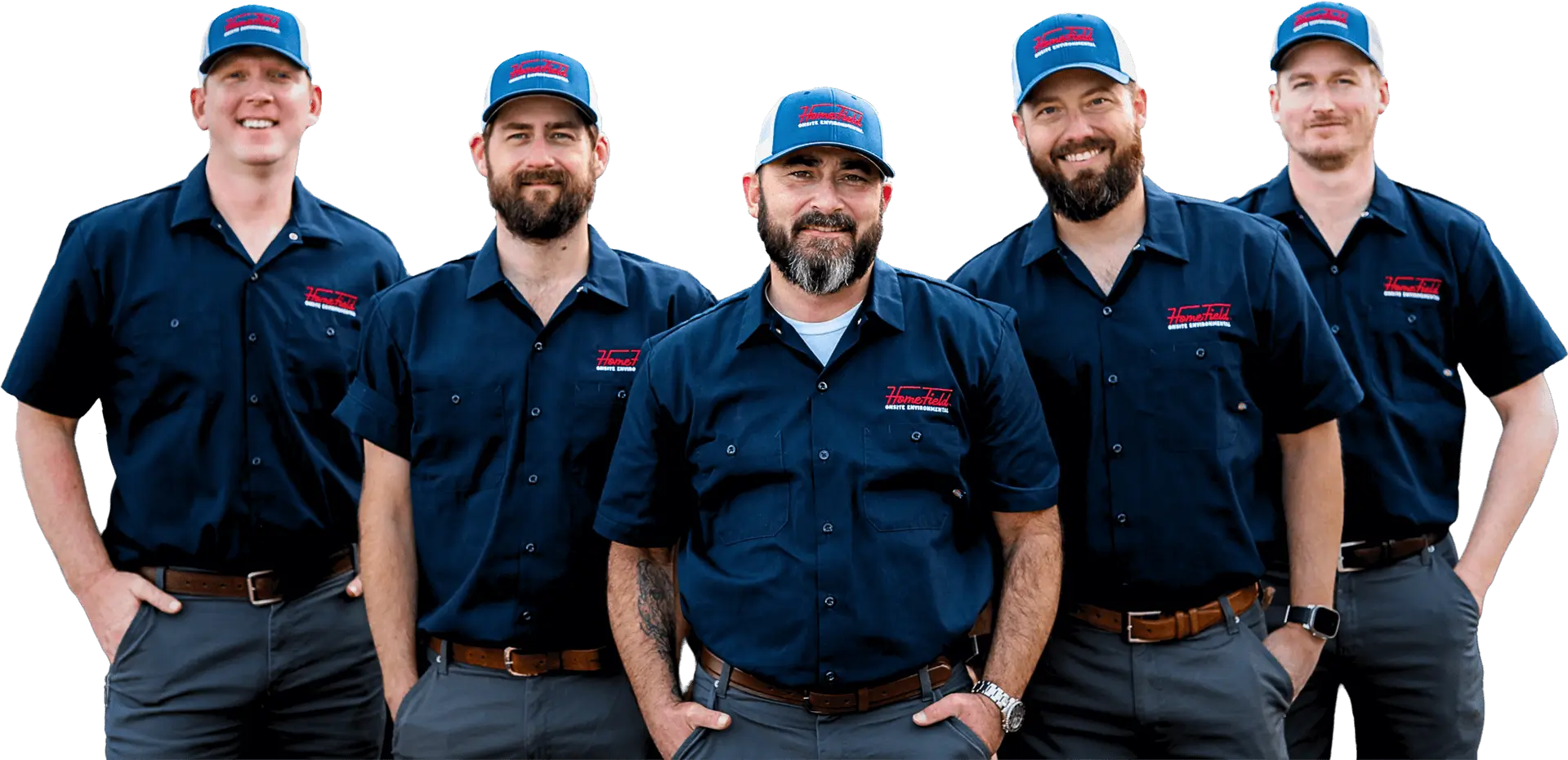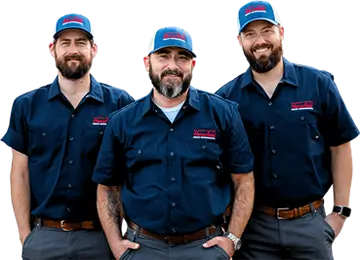Commercial Septic System Design In Ellis County
A Septic System That Fits Your Business
If your business runs on septic, you need commercial septic design planning before you install your next system. We do that for you.

Your HomeField Ellis County team can meet the unique needs of your business with a custom commercial septic system that’s right for the job.
How Can We Help?

Why You Need Help With
Septic Design
You don’t want your business to be hampered by a septic system that wasn’t designed for your growth and future. We’re here to make sure that doesn’t happen.
Things We Help You Think About:
- The Best Type Of System For Your Needs
- The Right Tank Size For Your Future Usage
- The Needed Size Of Any Drain Fields
- How To Fulfill All Regulatory Requirements
- Future-Proofing Your Septic System
Design The Commercial Septic System That Matches Your Business Needs
WHAT YOU SHOULD KNOW ABOUT
Commercial Septic Design
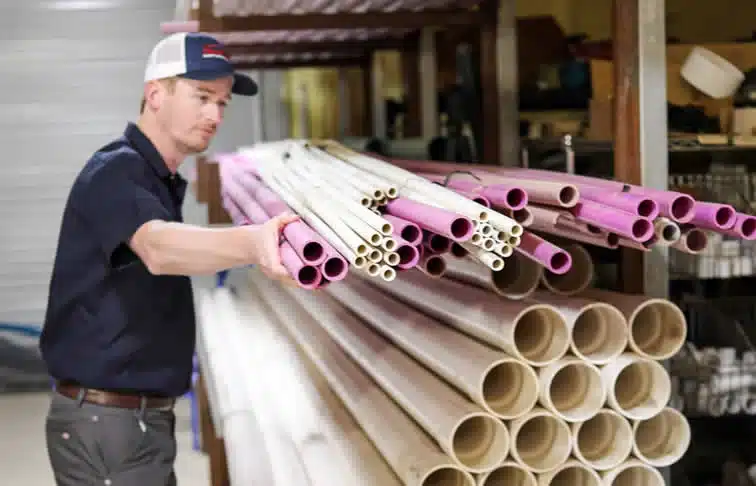
What Kind Of Septic System Is Best For My Local Business?
Our short answer is it’s probably going to be an aerobic septic system, both for soil and space saving considerations. 90% of the new installations we do are aerobic systems, and they’re efficient and long-lasting with the proper care. The longer answer is that if you
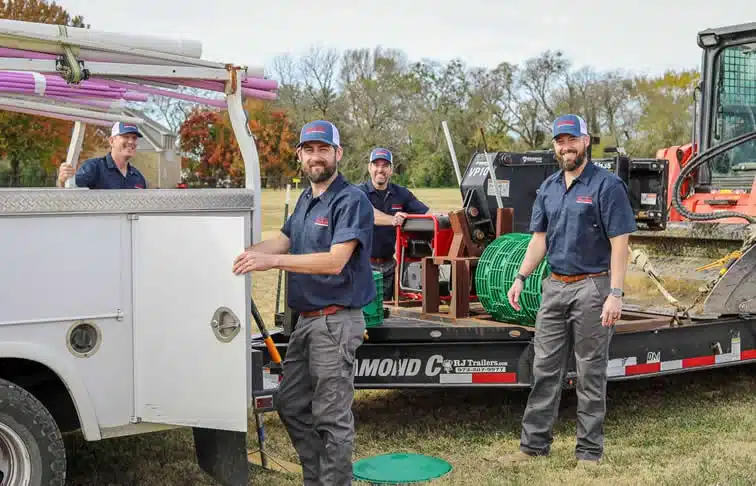
How Long Should My Commercial Septic System Last?
It depends! If you can get everyone to take good care of your system, along with scheduling regular septic pumps, preventative maintenance, and avoid flushing harmful things, your system could last 20+ years depending on use. But, if you aren’t proactive about your system’s
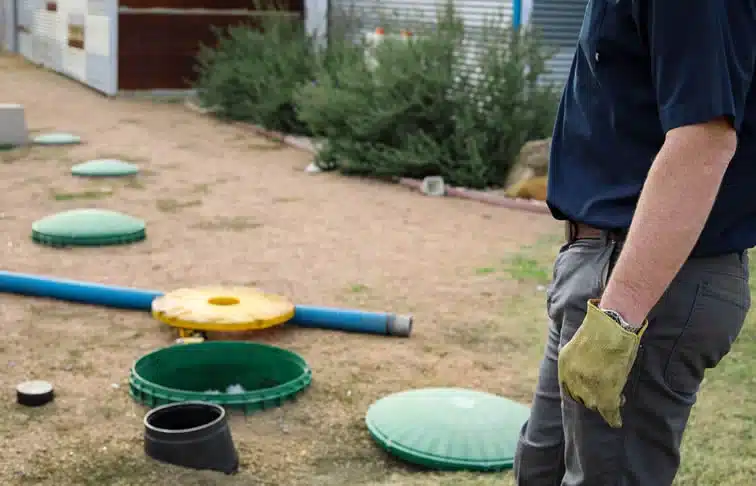
How Much Space Does A Commercial Septic System Need?
There are a lot of factors that can make the square footage of your system go up or down. The aerobic systems that are common here in Ellis County typically take less space to install than their conventional system counterparts. The major factors are how much you
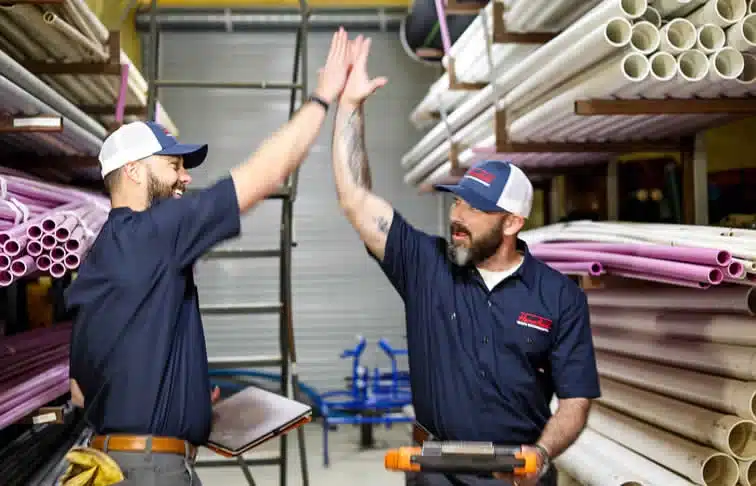
How Much Will My Septic System Cost To Actually Install?
Once you’ve designed your perfect septic system, now you have to install it. From a cost perspective, it’s like buying a new vehicle for your business. The type of system, size of your tank and drain field, and how easy it is bto access your property are all major factors on the
The system design must comply with TCEQ Chapter 285 regulations. An aerobic septic system in Ellis County, Texas, is an on-site sewage facility (OSSF) designed to treat and dispose of wastewater using aerobic (oxygen-loving) bacteria. These systems are often used in areas where traditional septic systems are not feasible due to soil conditions, space limitations, or environmental concerns. The system introduces air into the wastewater treatment process to promote the growth of aerobic bacteria, which break down organic matter more effectively than anaerobic bacteria used in conventional systems There are 4 treatment component steps of an Aerobic Septic System. Setbacks: Systems must meet distance requirements from property lines, water wells, and surface water. Address: 109 S. Jackson St., Waxahachie, TX 75165 Current regulations do not give homeowners the opportunity to maintain or repair their own OSSF systems. You must use a licensed OSSF expert. Your site must be evaluated by a licensed site evaluaor or a license engineer. The table in this link will provide the information needed to determine what type of system you will need: https://www.tceq.texas.gov/permitting/ossf/ossfsystems.html Watch what you put down the drain. Fats, grease and solids, even coffee grinds can clog your system. Even with the use of a garbage disposal. Don't overload your toilet. Keep your septic area clear of trees, shrubs and roots as these can clog and damage your septic system. Check your yard regularely for leaks or sign of improper drainage. Have your system inspected and maintained by your county and city requirements. Region 4, Dallas/Fort Worth You can call 817-588-5800, or write to Ellis County DOD 2309 Gravel Drive Fort Worth, TX 76118. In Waxahachie, Texas, outside of City Limits, the Ellis County Department of Development serves as the primary regulatory authority for on-site sewage facilities (OSSFs), commonly known as septic systems. This department oversees the permitting, installation, and inspection of septic systems to ensure compliance with local and state regulations. Contact Information: If your property is within the limits of a city in Ellis County: The city’s department overseeing on-site sewage facilities (OSSFs) will be the primary reviewer. They will ensure compliance with local ordinances and zoning regulations. Some cities in Ellis County may defer to Ellis County for septic permitting, inspections, or review, especially if they lack their own OSSF regulatory authority. Check with your city to confirm if Ellis County is involved. TCEQ oversees septic systems in Texas and ensures statewide compliance with Chapter 285 of the Texas Administrative Code. While they may not directly review all applications, your design and operation must comply with TCEQ regulations. Some cities may require review by a local environmental or public health official to confirm compliance with health standards.If your property is in a neighborhood governed by a homeowner’s association (HOA), the HOA may have additional requirements or restrictions for septic systems. For outside city limits the primary regulatory authority for septic systems is Ellis County Department of Development. They handle appilication reviews, inspections, and enforcement of local and state regulations. While Ellis County enforces the regulations, TCEQ provides overarching rules for on-site sewage systems. If your system design is unconventional or requires a variance, TCEQ may need to approve it. https://www.waxahachie.com/departments/building_and_community_services/index.php Once you go here you can also click on the respective city's website for city specific regulations. The class of soil required for an aerobic septic system (commonly called an aerobic treatment unit, or ATU) depends on its ability to handle treated wastewater effectively. Aerobic systems are often used when soil conditions are not suitable for conventional septic systems. Here's an overview of soil considerations for aerobic systems: Soil Requirements for an Aerobic System IF you live outside of any city limits but in Ellis County, then you need to follow the Ellis County regulations. If you live within city limits and in Ellis County then you abide by that cities requirements. You need to apply through the Ellis County Department of Development (DoD) and provide required documents, such as: All septic systems, regardless of location, must comply with the Texas Commission on Environmental Quality (TCEQ) standards. The Ellis County Department of Development (DoD) oversees permitting for on-site sewage facilities (OSSFs), but additional requirements may apply within city limits. You have to determine the regulatory authority for your city. Inside city limits, the city may have its own permitting process in addition to Ellis County’s requirements. Obtain an application from the Ellis County Department of Development or the city (if applicable). It must include a site evaluation and soil test conducted by a licensed professional. A system design prepared by a licensed engineer along with a property plat or site plan showing the setback and system layouts. On-site sewage facilities, or OSSFs, must be designed on the basis of a site evaluation that accounts for local conditions. It's the system of choice for approximately 20% of the new homes built in Texas...an On-Site Sewage Facility (OSSF), commonly called a "septic system." The sudden increase of new housing in suburban and rural areas means that more Texas households depend on an OSSF for treatment and disposal of domestic sewage. In recent years many new systems have been permitted, most in high growth areas of the state. New approaches to design and overseeing OSSFs ensure systems do their job properly and protect the environment. Properties within city limits may be subject to both county and city regulations. Although, Ellis County Department of Development still oversees TCEQ-mandated requirements for on site sewage facitlites (OSSF), your city authorities may impose additional regulations. These regulations and contact information can be answered by selecting city specific Permit Application questions in these FAQs. Cities may charge separate fees for their approval process and inspections. Within the city limits city inspectors may work with county inspectors. All septic systems, regardless of location, must comply with the Texas Commission on Environmental Quality (TCEQ) standards. The Ellis County Department of Development (DoD) oversees permitting for on-site sewage facilities (OSSFs), but additional requirements may apply within city limits. You have to determine the regulatory authority for your city. Inside city limits, the city may have its own permitting process in addition to Ellis County’s requirements. Obtain an application from the Ellis County Department of Development or the city (if applicable). It must include a site evaluation and soil test conducted by a licensed professional. A system design prepared by a licensed engineer along with a property plat or site plan showing the setback and system layouts. For properties located inside city limits in Ellis County, Texas, septic maintenance and operation requirements are primarily guided by Texas Commission on Environmental Quality (TCEQ) regulations, but additional rules may apply depending on the specific city’s ordinances. See city specific FAQs for further detail. We recommend that you contact your cities permitting office for detailed information. In summary, conventional septic systems should have the tanks pumped every 3-5 years to prenent sludge build up and system failure. Regular inspections will be required by a licesnes provider. Any repairs must meet the TCEQ standards and may require city approval. for Aerobic Treatment Units you will need maintenance contracts by a licensed provider. A contract should include periodic inspections, testing and maintenance 3 times per years or as required by your city permit. Systems using chlorine disinfection must have chlorine tablets replenished regularly with septic-safe chlorine products. An aerobic septic system in Ellis County, Texas, is an on-site sewage facility (OSSF) designed to treat and dispose of wastewater using aerobic (oxygen-loving) bacteria. These systems are often used in areas where traditional septic systems are not feasible due to soil conditions, space limitations, or environmental concerns. Maintenance reports for aerobic systems must be submitted by licensed providers and submitted in a timely manner. Homeowners should maintain records of maintenance, pumping and repair activities. Further requirements for an outside cities can be found in other FAQs for that city. The system introduces air into the wastewater treatment process to promote the growth of aerobic bacteria, which break down organic matter more effectively than anaerobic bacteria used in conventional systems The system design must comply with TCEQ Chapter 285 regulations. Some cities may impose additional rules, stricter setbacks and enhanced treatment standards or addtional inspections. Follow your specific city guidelines along with those in the TCEQ Chapter 285 regulations. There are 4 treatment component steps of an Aerobic Septic System. Setbacks: Systems must meet distance requirements from property lines, water wells, and surface water. See city specifc questions for more detail. Setbacks: Systems must meet distance requirements from property lines, water wells, and surface water. This will depend on the actual city requirements, not Ellis County Requirements. These regulations and contact information can be answered by selecting city specific Permit Application questions in these FAQs. Address: 109 S. Jackson St., Waxahachie, TX 75165 On-site sewage facilities, or OSSFs, must be designed on the basis of a site evaluation that accounts for local conditions. It's the system of choice for approximately 20% of the new homes built in Texas...an On-Site Sewage Facility (OSSF), commonly called a "septic system." The sudden increase of new housing in suburban and rural areas means that more Texas households depend on an OSSF for treatment and disposal of domestic sewage. In recent years many new systems have been permitted, most in high growth areas of the state. New approaches to design and overseeing OSSFs ensure systems do their job properly and protect the environment. Current regulations do not give homeowners the opportunity to maintain or repair their own OSSF systems. You must use a licensed OSSF expert. Your site must be evaluated by a licensed site evaluaor or a license engineer. The table in this link will provide the information needed to determine what type of system you will need: https://www.tceq.texas.gov/permitting/ossf/ossfsystems.html Watch what you put down the drain. Fats, grease and solids, even coffee grinds can clog your system. Even with the use of a garbage disposal. Don't overload your toilet. Keep your septic area clear of trees, shrubs and roots as these can clog and damage your septic system. Check your yard regularely for leaks or sign of improper drainage. Have your system inspected and maintained by your county and city requirements. Region 4, Dallas/Fort Worth You can call 817-588-5800, or write to Ellis County DOD 2309 Gravel Drive Fort Worth, TX 76118. If your property is within the limits of a city in Ellis County: The city’s department overseeing on-site sewage facilities (OSSFs) will be the primary reviewer. They will ensure compliance with local ordinances and zoning regulations. Some cities in Ellis County may defer to Ellis County for septic permitting, inspections, or review, especially if they lack their own OSSF regulatory authority. Check with your city to confirm if Ellis County is involved. TCEQ oversees septic systems in Texas and ensures statewide compliance with Chapter 285 of the Texas Administrative Code. While they may not directly review all applications, your design and operation must comply with TCEQ regulations. Some cities may require review by a local environmental or public health official to confirm compliance with health standards.If your property is in a neighborhood governed by a homeowner’s association (HOA), the HOA may have additional requirements or restrictions for septic systems. For outside city limits the primary regulatory authority for septic systems is Ellis County Department of Development. They handle appilication reviews, inspections, and enforcement of local and state regulations. While Ellis County enforces the regulations, TCEQ provides overarching rules for on-site sewage systems. If your system design is unconventional or requires a variance, TCEQ may need to approve it. https://www.waxahachie.com/departments/building_and_community_services/index.php Once you go here you can also click on the respective city's website for city specific regulations. In Grand Prairie, Texas, regulations for on-site sewage facilities (OSSFs), commonly known as septic systems, are outlined in the city's Code of Ordinances.You can see the regulations here: https://library.municode.com/tx/grand_prairie/codes/code_of_ordinances?nodeId=PTIICOOR_CH13HESA_ARTXITESEFA_S13-201RIENINSA All on-site sewage facilities within Grand Prairie must comply with the provisions outlined in the city's ordinances. The design, construction, and installation of each system must adhere to specific conditions affecting each lot or tract and must be approved by the city. Systems must comply with the Texas Commission on Environmental Quality (TCEQ) regulations, specifically Chapter 285, which outlines the state's official regulations regarding on-site sewage facilities. You can also call the Grand Prairie Environmental Quality Division at 972-237-8055. Their address is: 206 W. Church St., Grand Prairie, TX 75050 In the City of Grand Prairie, Texas, the regulation and permitting of on-site sewage facilities (OSSFs), commonly known as septic systems, are managed by the city's Public Health & Environmental Quality Department. They oversee the application, inspection, and approval processes for septic systems within Grand Prairie. https://www.gptx.org/Departments/Public-Health-and-Environmental-Quality/Environmental-Quality/Permits-Policies/On-Site-Sewage/ For detailed information on septic system regulations, permit applications, and requirements, you can contact the Public Health & Environmental Quality Department: It's advisable to reach out to them directly to ensure you receive the most accurate and up-to-date information regarding septic system regulations and permitting processes in your area. The class of soil required for an aerobic septic system (commonly called an aerobic treatment unit, or ATU) depends on its ability to handle treated wastewater effectively. Aerobic systems are often used when soil conditions are not suitable for conventional septic systems. Here's an overview of soil considerations for aerobic systems: Soil Requirements for an Aerobic System All septic systems, regardless of location, must comply with the Texas Commission on Environmental Quality (TCEQ) standards. The Ellis County Department of Development (DoD) oversees permitting for on-site sewage facilities (OSSFs), but additional requirements may apply within city limits. You have to determine the regulatory authority for your city. Inside city limits, the city may have its own permitting process in addition to Ellis County’s requirements. Obtain an application from the Ellis County Department of Development or the city (if applicable). It must include a site evaluation and soil test conducted by a licensed professional. A system design prepared by a licensed engineer along with a property plat or site plan showing the setback and system layouts. For properties located inside city limits in Ellis County, Texas, septic maintenance and operation requirements are primarily guided by Texas Commission on Environmental Quality (TCEQ) regulations, but additional rules may apply depending on the specific city’s ordinances. See city specific FAQs for further detail. We recommend that you contact your cities permitting office for detailed information. In summary, conventional septic systems should have the tanks pumped every 3-5 years to prenent sludge build up and system failure. Regular inspections will be required by a licesnes provider. Any repairs must meet the TCEQ standards and may require city approval. for Aerobic Treatment Units you will need maintenance contracts by a licensed provider. A contract should include periodic inspections, testing and maintenance 3 times per years or as required by your city permit. Systems using chlorine disinfection must have chlorine tablets replenished regularly with septic-safe chlorine products. An aerobic septic system in Ellis County, Texas, is an on-site sewage facility (OSSF) designed to treat and dispose of wastewater using aerobic (oxygen-loving) bacteria. These systems are often used in areas where traditional septic systems are not feasible due to soil conditions, space limitations, or environmental concerns. Maintenance reports for aerobic systems must be submitted by licensed providers and submitted in a timely manner. Homeowners should maintain records of maintenance, pumping and repair activities. Further requirements for an outside cities can be found in other FAQs for that city. The system introduces air into the wastewater treatment process to promote the growth of aerobic bacteria, which break down organic matter more effectively than anaerobic bacteria used in conventional systems The system design must comply with TCEQ Chapter 285 regulations. Some cities may impose additional rules, stricter setbacks and enhanced treatment standards or addtional inspections. Follow your specific city guidelines along with those in the TCEQ Chapter 285 regulations. There are 4 treatment component steps of an Aerobic Septic System. Setbacks: Systems must meet distance requirements from property lines, water wells, and surface water. See city specifc questions for more detail. Setbacks: Systems must meet distance requirements from property lines, water wells, and surface water. This will depend on the actual city requirements, not Ellis County Requirements. These regulations and contact information can be answered by selecting city specific Permit Application questions in these FAQs. Address: 109 S. Jackson St., Waxahachie, TX 75165 On-site sewage facilities, or OSSFs, must be designed on the basis of a site evaluation that accounts for local conditions. It's the system of choice for approximately 20% of the new homes built in Texas...an On-Site Sewage Facility (OSSF), commonly called a "septic system." The sudden increase of new housing in suburban and rural areas means that more Texas households depend on an OSSF for treatment and disposal of domestic sewage. In recent years many new systems have been permitted, most in high growth areas of the state. New approaches to design and overseeing OSSFs ensure systems do their job properly and protect the environment. Current regulations do not give homeowners the opportunity to maintain or repair their own OSSF systems. You must use a licensed OSSF expert. Your site must be evaluated by a licensed site evaluaor or a license engineer. The table in this link will provide the information needed to determine what type of system you will need: https://www.tceq.texas.gov/permitting/ossf/ossfsystems.html Watch what you put down the drain. Fats, grease and solids, even coffee grinds can clog your system. Even with the use of a garbage disposal. Don't overload your toilet. Keep your septic area clear of trees, shrubs and roots as these can clog and damage your septic system. Check your yard regularely for leaks or sign of improper drainage. Have your system inspected and maintained by your county and city requirements. Region 4, Dallas/Fort Worth You can call 817-588-5800, or write to Ellis County DOD 2309 Gravel Drive Fort Worth, TX 76118. If your property is within the limits of a city in Ellis County: The city’s department overseeing on-site sewage facilities (OSSFs) will be the primary reviewer. They will ensure compliance with local ordinances and zoning regulations. Some cities in Ellis County may defer to Ellis County for septic permitting, inspections, or review, especially if they lack their own OSSF regulatory authority. Check with your city to confirm if Ellis County is involved. TCEQ oversees septic systems in Texas and ensures statewide compliance with Chapter 285 of the Texas Administrative Code. While they may not directly review all applications, your design and operation must comply with TCEQ regulations. Some cities may require review by a local environmental or public health official to confirm compliance with health standards.If your property is in a neighborhood governed by a homeowner’s association (HOA), the HOA may have additional requirements or restrictions for septic systems. For outside city limits the primary regulatory authority for septic systems is Ellis County Department of Development. They handle appilication reviews, inspections, and enforcement of local and state regulations. While Ellis County enforces the regulations, TCEQ provides overarching rules for on-site sewage systems. If your system design is unconventional or requires a variance, TCEQ may need to approve it. https://www.waxahachie.com/departments/building_and_community_services/index.php Once you go here you can also click on the respective city's website for city specific regulations. In Red Oak, Texas, regulations for on-site sewage facilities (OSSFs), commonly known as septic systems, are outlined in the city's Code of Ordinances. You can see the city's Code of Ordinances here: https://ecode360.com/39819716 All on-site sewage facilities within Red Oak must comply with the provisions outlined in the city's ordinances. The design, construction, and installation of each system must adhere to specific conditions affecting each lot or tract and must be approved by the city. Systems must comply with the Texas Commission on Environmental Quality (TCEQ) regulations, specifically Chapter 285, which outlines the state's official regulations regarding on-site sewage facilities. You can reach them at 972-576-3414 and the address is: 101 S. Live Oak Street, Red Oak, TX 75154For properties within Red Oak city limits, it's essential to adhere to these specific regulations regarding septic systems. The city's Development Services Department can provide guidance and ensure compliance with local ordinances and state regulations. In the City of Red Oak, Texas, the regulation and permitting of on-site sewage facilities (OSSFs), commonly known as septic systems, are managed by the Ellis County Department of Development. They oversee the application, inspection, and approval processes for septic systems within the county, including areas within Red Oak. For detailed information on septic system regulations, permit applications, and requirements, you can contact the Ellis County Department of Development: It's advisable to reach out to them directly to ensure you receive the most accurate and up-to-date information regarding septic system regulations and permitting processes in your area. The class of soil required for an aerobic septic system (commonly called an aerobic treatment unit, or ATU) depends on its ability to handle treated wastewater effectively. Aerobic systems are often used when soil conditions are not suitable for conventional septic systems. Here's an overview of soil considerations for aerobic systems: Soil Requirements for an Aerobic System All septic systems, regardless of location, must comply with the Texas Commission on Environmental Quality (TCEQ) standards. The Ellis County Department of Development (DoD) oversees permitting for on-site sewage facilities (OSSFs), but additional requirements may apply within city limits. You have to determine the regulatory authority for your city. Inside city limits, the city may have its own permitting process in addition to Ellis County’s requirements. Obtain an application from the Ellis County Department of Development or the city (if applicable). It must include a site evaluation and soil test conducted by a licensed professional. A system design prepared by a licensed engineer along with a property plat or site plan showing the setback and system layouts. For properties located inside city limits in Ellis County, Texas, septic maintenance and operation requirements are primarily guided by Texas Commission on Environmental Quality (TCEQ) regulations, but additional rules may apply depending on the specific city’s ordinances. See city specific FAQs for further detail. We recommend that you contact your cities permitting office for detailed information. In summary, conventional septic systems should have the tanks pumped every 3-5 years to prenent sludge build up and system failure. Regular inspections will be required by a licesnes provider. Any repairs must meet the TCEQ standards and may require city approval. for Aerobic Treatment Units you will need maintenance contracts by a licensed provider. A contract should include periodic inspections, testing and maintenance 3 times per years or as required by your city permit. Systems using chlorine disinfection must have chlorine tablets replenished regularly with septic-safe chlorine products. An aerobic septic system in Ellis County, Texas, is an on-site sewage facility (OSSF) designed to treat and dispose of wastewater using aerobic (oxygen-loving) bacteria. These systems are often used in areas where traditional septic systems are not feasible due to soil conditions, space limitations, or environmental concerns. Maintenance reports for aerobic systems must be submitted by licensed providers and submitted in a timely manner. Homeowners should maintain records of maintenance, pumping and repair activities. Further requirements for an outside cities can be found in other FAQs for that city. The system introduces air into the wastewater treatment process to promote the growth of aerobic bacteria, which break down organic matter more effectively than anaerobic bacteria used in conventional systems The system design must comply with TCEQ Chapter 285 regulations. Some cities may impose additional rules, stricter setbacks and enhanced treatment standards or addtional inspections. Follow your specific city guidelines along with those in the TCEQ Chapter 285 regulations. There are 4 treatment component steps of an Aerobic Septic System. Setbacks: Systems must meet distance requirements from property lines, water wells, and surface water. See city specifc questions for more detail. Setbacks: Systems must meet distance requirements from property lines, water wells, and surface water. This will depend on the actual city requirements, not Ellis County Requirements. These regulations and contact information can be answered by selecting city specific Permit Application questions in these FAQs. Address: 109 S. Jackson St., Waxahachie, TX 75165 On-site sewage facilities, or OSSFs, must be designed on the basis of a site evaluation that accounts for local conditions. It's the system of choice for approximately 20% of the new homes built in Texas...an On-Site Sewage Facility (OSSF), commonly called a "septic system." The sudden increase of new housing in suburban and rural areas means that more Texas households depend on an OSSF for treatment and disposal of domestic sewage. In recent years many new systems have been permitted, most in high growth areas of the state. New approaches to design and overseeing OSSFs ensure systems do their job properly and protect the environment. Current regulations do not give homeowners the opportunity to maintain or repair their own OSSF systems. You must use a licensed OSSF expert. Your site must be evaluated by a licensed site evaluaor or a license engineer. The table in this link will provide the information needed to determine what type of system you will need: https://www.tceq.texas.gov/permitting/ossf/ossfsystems.html Watch what you put down the drain. Fats, grease and solids, even coffee grinds can clog your system. Even with the use of a garbage disposal. Don't overload your toilet. Keep your septic area clear of trees, shrubs and roots as these can clog and damage your septic system. Check your yard regularely for leaks or sign of improper drainage. Have your system inspected and maintained by your county and city requirements. Region 4, Dallas/Fort Worth You can call 817-588-5800, or write to Ellis County DOD 2309 Gravel Drive Fort Worth, TX 76118. If your property is within the limits of a city in Ellis County: The city’s department overseeing on-site sewage facilities (OSSFs) will be the primary reviewer. They will ensure compliance with local ordinances and zoning regulations. Some cities in Ellis County may defer to Ellis County for septic permitting, inspections, or review, especially if they lack their own OSSF regulatory authority. Check with your city to confirm if Ellis County is involved. TCEQ oversees septic systems in Texas and ensures statewide compliance with Chapter 285 of the Texas Administrative Code. While they may not directly review all applications, your design and operation must comply with TCEQ regulations. Some cities may require review by a local environmental or public health official to confirm compliance with health standards.If your property is in a neighborhood governed by a homeowner’s association (HOA), the HOA may have additional requirements or restrictions for septic systems. For outside city limits the primary regulatory authority for septic systems is Ellis County Department of Development. They handle appilication reviews, inspections, and enforcement of local and state regulations. While Ellis County enforces the regulations, TCEQ provides overarching rules for on-site sewage systems. If your system design is unconventional or requires a variance, TCEQ may need to approve it. https://www.waxahachie.com/departments/building_and_community_services/index.php Once you go here you can also click on the respective city's website for city specific regulations. In Ennis, Texas, the regulations for on-site sewage facilities (OSSFs), commonly known as septic systems, are governed by the city's Code of Ordinances.You can visit their website at: https://librarystage.municode.com/tx/ennis/codes/code_of_ordinances?nodeId=PTIICO_CH18UT_ARTVIITESEDII All on-site sewage facilities within Ennis must comply with the rules adopted in Section 18-405 of the Code of Ordinances.https://librarystage.municode.com/tx/ennis/codes/code_of_ordinances?nodeId=PTIICO_CH18UT_ARTVIITESEDI_S18-401CO&utm_source=chatgpt.com The design, construction, and installation of each system are based upon specific conditions affecting each lot or tract and must be approved by the city. Systems must adhere to the Texas Administrative Code, which outlines the state's official regulations regarding on-site sewage facilities. https://www.co.ellis.tx.us/768/County-Ordinances-and-Policies?utm_source=chatgpt.com The phone number for the Ennis Building Inspections Department is: 972-875-6442. The address is 107 N Sherman St., Ennis, TX 75119 For properties within Ennis city limits, it's essential to adhere to these specific regulations regarding septic systems. The city's Building Inspections Department can provide guidance and ensure compliance with local ordinances and state regulations. In the City of Ennis, Texas, the regulation and permitting of on-site sewage facilities (OSSFs), commonly known as septic systems, are managed by the city's Health Services Department. They oversee the application, inspection, and approval processes for septic systems within Ennis. For detailed information on septic system regulations, permit applications, and requirements, you can contact the Health Services Department: The class of soil required for an aerobic septic system (commonly called an aerobic treatment unit, or ATU) depends on its ability to handle treated wastewater effectively. Aerobic systems are often used when soil conditions are not suitable for conventional septic systems. Here's an overview of soil considerations for aerobic systems: Soil Requirements for an Aerobic System All septic systems, regardless of location, must comply with the Texas Commission on Environmental Quality (TCEQ) standards. The Ellis County Department of Development (DoD) oversees permitting for on-site sewage facilities (OSSFs), but additional requirements may apply within city limits. You have to determine the regulatory authority for your city. Inside city limits, the city may have its own permitting process in addition to Ellis County’s requirements. Obtain an application from the Ellis County Department of Development or the city (if applicable). It must include a site evaluation and soil test conducted by a licensed professional. A system design prepared by a licensed engineer along with a property plat or site plan showing the setback and system layouts. For properties located inside city limits in Ellis County, Texas, septic maintenance and operation requirements are primarily guided by Texas Commission on Environmental Quality (TCEQ) regulations, but additional rules may apply depending on the specific city’s ordinances. See city specific FAQs for further detail. We recommend that you contact your cities permitting office for detailed information. In summary, conventional septic systems should have the tanks pumped every 3-5 years to prenent sludge build up and system failure. Regular inspections will be required by a licesnes provider. Any repairs must meet the TCEQ standards and may require city approval. for Aerobic Treatment Units you will need maintenance contracts by a licensed provider. A contract should include periodic inspections, testing and maintenance 3 times per years or as required by your city permit. Systems using chlorine disinfection must have chlorine tablets replenished regularly with septic-safe chlorine products. An aerobic septic system in Ellis County, Texas, is an on-site sewage facility (OSSF) designed to treat and dispose of wastewater using aerobic (oxygen-loving) bacteria. These systems are often used in areas where traditional septic systems are not feasible due to soil conditions, space limitations, or environmental concerns. Maintenance reports for aerobic systems must be submitted by licensed providers and submitted in a timely manner. Homeowners should maintain records of maintenance, pumping and repair activities. Further requirements for an outside cities can be found in other FAQs for that city. The system introduces air into the wastewater treatment process to promote the growth of aerobic bacteria, which break down organic matter more effectively than anaerobic bacteria used in conventional systems The system design must comply with TCEQ Chapter 285 regulations. Some cities may impose additional rules, stricter setbacks and enhanced treatment standards or addtional inspections. Follow your specific city guidelines along with those in the TCEQ Chapter 285 regulations. There are 4 treatment component steps of an Aerobic Septic System. Setbacks: Systems must meet distance requirements from property lines, water wells, and surface water. See city specifc questions for more detail. Setbacks: Systems must meet distance requirements from property lines, water wells, and surface water. This will depend on the actual city requirements, not Ellis County Requirements. These regulations and contact information can be answered by selecting city specific Permit Application questions in these FAQs. Address: 109 S. Jackson St., Waxahachie, TX 75165 On-site sewage facilities, or OSSFs, must be designed on the basis of a site evaluation that accounts for local conditions. It's the system of choice for approximately 20% of the new homes built in Texas...an On-Site Sewage Facility (OSSF), commonly called a "septic system." The sudden increase of new housing in suburban and rural areas means that more Texas households depend on an OSSF for treatment and disposal of domestic sewage. In recent years many new systems have been permitted, most in high growth areas of the state. New approaches to design and overseeing OSSFs ensure systems do their job properly and protect the environment. Current regulations do not give homeowners the opportunity to maintain or repair their own OSSF systems. You must use a licensed OSSF expert. Your site must be evaluated by a licensed site evaluaor or a license engineer. The table in this link will provide the information needed to determine what type of system you will need: https://www.tceq.texas.gov/permitting/ossf/ossfsystems.html Watch what you put down the drain. Fats, grease and solids, even coffee grinds can clog your system. Even with the use of a garbage disposal. Don't overload your toilet. Keep your septic area clear of trees, shrubs and roots as these can clog and damage your septic system. Check your yard regularely for leaks or sign of improper drainage. Have your system inspected and maintained by your county and city requirements. Region 4, Dallas/Fort Worth You can call 817-588-5800, or write to Ellis County DOD 2309 Gravel Drive Fort Worth, TX 76118. If your property is within the limits of a city in Ellis County: The city’s department overseeing on-site sewage facilities (OSSFs) will be the primary reviewer. They will ensure compliance with local ordinances and zoning regulations. Some cities in Ellis County may defer to Ellis County for septic permitting, inspections, or review, especially if they lack their own OSSF regulatory authority. Check with your city to confirm if Ellis County is involved. TCEQ oversees septic systems in Texas and ensures statewide compliance with Chapter 285 of the Texas Administrative Code. While they may not directly review all applications, your design and operation must comply with TCEQ regulations. Some cities may require review by a local environmental or public health official to confirm compliance with health standards.If your property is in a neighborhood governed by a homeowner’s association (HOA), the HOA may have additional requirements or restrictions for septic systems. For outside city limits the primary regulatory authority for septic systems is Ellis County Department of Development. They handle appilication reviews, inspections, and enforcement of local and state regulations. While Ellis County enforces the regulations, TCEQ provides overarching rules for on-site sewage systems. If your system design is unconventional or requires a variance, TCEQ may need to approve it. https://www.waxahachie.com/departments/building_and_community_services/index.php Once you go here you can also click on the respective city's website for city specific regulations. In Ovilla, Texas, the city's regulations for on-site sewage facilities (OSSFs), commonly known as septic systems, are outlined in the municipal code. You can visit the website at: Water and Sewage Utilities - City of Ovilla, TX - eCode360 The phone number is 972-617-7262 and the Address is: 105 S. Cockrell Hill Rd, Ovilla, TX 75154 For properties within Ovilla's city limits, it's essential to adhere to these specific regulations regarding septic systems. The city's Building Inspections Department can provide guidance and ensure compliance with local ordinances and state regulations. In the City of Ovilla, Texas, the regulation and permitting of on-site sewage facilities (OSSFs), commonly known as septic systems, are managed by the city's Code Enforcement Department. They oversee the application, inspection, and approval processes for septic systems within Ovilla. https://www.cityofovilla.org/71/Code-Enforcement/ For detailed information on septic system regulations, permit applications, and requirements, you can contact the Code Enforcement Department: It's advisable to reach out to them directly to ensure you receive the most accurate and up-to-date information regarding septic system regulations and permitting processes in your area. The class of soil required for an aerobic septic system (commonly called an aerobic treatment unit, or ATU) depends on its ability to handle treated wastewater effectively. Aerobic systems are often used when soil conditions are not suitable for conventional septic systems. Here's an overview of soil considerations for aerobic systems: Soil Requirements for an Aerobic System All septic systems, regardless of location, must comply with the Texas Commission on Environmental Quality (TCEQ) standards. The Ellis County Department of Development (DoD) oversees permitting for on-site sewage facilities (OSSFs), but additional requirements may apply within city limits. You have to determine the regulatory authority for your city. Inside city limits, the city may have its own permitting process in addition to Ellis County’s requirements. Obtain an application from the Ellis County Department of Development or the city (if applicable). It must include a site evaluation and soil test conducted by a licensed professional. A system design prepared by a licensed engineer along with a property plat or site plan showing the setback and system layouts. For properties located inside city limits in Ellis County, Texas, septic maintenance and operation requirements are primarily guided by Texas Commission on Environmental Quality (TCEQ) regulations, but additional rules may apply depending on the specific city’s ordinances. See city specific FAQs for further detail. We recommend that you contact your cities permitting office for detailed information. In summary, conventional septic systems should have the tanks pumped every 3-5 years to prenent sludge build up and system failure. Regular inspections will be required by a licesnes provider. Any repairs must meet the TCEQ standards and may require city approval. for Aerobic Treatment Units you will need maintenance contracts by a licensed provider. A contract should include periodic inspections, testing and maintenance 3 times per years or as required by your city permit. Systems using chlorine disinfection must have chlorine tablets replenished regularly with septic-safe chlorine products. An aerobic septic system in Ellis County, Texas, is an on-site sewage facility (OSSF) designed to treat and dispose of wastewater using aerobic (oxygen-loving) bacteria. These systems are often used in areas where traditional septic systems are not feasible due to soil conditions, space limitations, or environmental concerns. Maintenance reports for aerobic systems must be submitted by licensed providers and submitted in a timely manner. Homeowners should maintain records of maintenance, pumping and repair activities. Further requirements for an outside cities can be found in other FAQs for that city. The system introduces air into the wastewater treatment process to promote the growth of aerobic bacteria, which break down organic matter more effectively than anaerobic bacteria used in conventional systems The system design must comply with TCEQ Chapter 285 regulations. Some cities may impose additional rules, stricter setbacks and enhanced treatment standards or addtional inspections. Follow your specific city guidelines along with those in the TCEQ Chapter 285 regulations. There are 4 treatment component steps of an Aerobic Septic System. Setbacks: Systems must meet distance requirements from property lines, water wells, and surface water. See city specifc questions for more detail. Setbacks: Systems must meet distance requirements from property lines, water wells, and surface water. In Waxahachie, Texas, inside of City Limits, Building Community Services of Waxahachie serves as the primary regulatory authority for on-site sewage facilities (OSSFs), commonly known as septic systems. This department oversees the permitting, installation, and inspection of septic systems to ensure compliance with local and state regulations. Contact Information: Address: 109 S. Jackson St., Waxahachie, TX 75165 This will depend on the actual city requirements, not Ellis County Requirements. These regulations and contact information can be answered by selecting city specific Permit Application questions in these FAQs. Current regulations do not give homeowners the opportunity to maintain or repair their own OSSF systems. You must use a licensed OSSF expert. On-site sewage facilities, or OSSFs, must be designed on the basis of a site evaluation that accounts for local conditions. It's the system of choice for approximately 20% of the new homes built in Texas...an On-Site Sewage Facility (OSSF), commonly called a "septic system." The sudden increase of new housing in suburban and rural areas means that more Texas households depend on an OSSF for treatment and disposal of domestic sewage. In recent years many new systems have been permitted, most in high growth areas of the state. New approaches to design and overseeing OSSFs ensure systems do their job properly and protect the environment. Your site must be evaluated by a licensed site evaluaor or a license engineer. The table in this link will provide the information needed to determine what type of system you will need: https://www.tceq.texas.gov/permitting/ossf/ossfsystems.html Watch what you put down the drain. Fats, grease and solids, even coffee grinds can clog your system. Even with the use of a garbage disposal. Don't overload your toilet. Keep your septic area clear of trees, shrubs and roots as these can clog and damage your septic system. Check your yard regularely for leaks or sign of improper drainage. Have your system inspected and maintained by your county and city requirements. Region 4, Dallas/Fort Worth You can call 817-588-5800, or write to Ellis County DOD 2309 Gravel Drive Fort Worth, TX 76118. If your property is within the limits of a city in Ellis County: The city’s department overseeing on-site sewage facilities (OSSFs) will be the primary reviewer. They will ensure compliance with local ordinances and zoning regulations. Some cities in Ellis County may defer to Ellis County for septic permitting, inspections, or review, especially if they lack their own OSSF regulatory authority. Check with your city to confirm if Ellis County is involved. TCEQ oversees septic systems in Texas and ensures statewide compliance with Chapter 285 of the Texas Administrative Code. While they may not directly review all applications, your design and operation must comply with TCEQ regulations. Some cities may require review by a local environmental or public health official to confirm compliance with health standards.If your property is in a neighborhood governed by a homeowner’s association (HOA), the HOA may have additional requirements or restrictions for septic systems. For outside city limits the primary regulatory authority for septic systems is Ellis County Department of Development. They handle appilication reviews, inspections, and enforcement of local and state regulations. While Ellis County enforces the regulations, TCEQ provides overarching rules for on-site sewage systems. If your system design is unconventional or requires a variance, TCEQ may need to approve it. https://www.waxahachie.com/departments/building_and_community_services/index.php Once you go here you can also click on the respective city's website for city specific regulations. n Waxahac anaged by the city's Building and Community Services Department. You can see the regulations here: https://library.municode.com/tx/waxahachie/codes/code_of_ordinances?nodeId=COOR_CH33UT_ARTVITESEDI_S33- 138PEFE&showChanges=true This section outlines the city's regulations for the permitting, design, construction, and maintenance of OSSFs within Waxahachie city limits. https://www.waxahachie.com/departments/building_and_community_services/permitting_applications.php . This page provides access to the On-Site Sewer Facility Permit Application, which is required for installing or modifying a septic system within the city. TCEQ provides statewide regulations and guidelines for OSSFs, which are applicable in conjunction with local ordinances. The link to TCEQ is https://www.tceq.texas.gov/permitting/ossf The phone number of the Building and Community Serices Department is 469-309-4020. The address is 401 S. Rogers St., Waxahachie, TX 75165 Although we advise contacting the Department of building and community services for Waxahache, TX, the general setbacks are: Septic Tanks and Drainfields: In the City of Waxahachie, Texas, the regulation and permitting of on-site sewage facilities (OSSFs), commonly known as septic systems, are managed by the Ellis County Department of Development. They oversee the application, inspection, and approval processes for septic systems within the county, including areas within Waxahachie. https://www.ellispermits.com/permits The City of Waxahachie has adopted standards set by the Texas Department of Health for private sewage facilities and septic tank disposal systems. For detailed information on septic system regulations, permit applications, and requirements, you can contact the Ellis County Department of Development: The class of soil required for an aerobic septic system (commonly called an aerobic treatment unit, or ATU) depends on its ability to handle treated wastewater effectively. Aerobic systems are often used when soil conditions are not suitable for conventional septic systems. Here's an overview of soil considerations for aerobic systems: Soil Requirements for an Aerobic System All septic systems, regardless of location, must comply with the Texas Commission on Environmental Quality (TCEQ) standards. The Ellis County Department of Development (DoD) oversees permitting for on-site sewage facilities (OSSFs), but additional requirements may apply within city limits. You have to determine the regulatory authority for your city. Inside city limits, the city may have its own permitting process in addition to Ellis County’s requirements. Obtain an application from the Ellis County Department of Development or the city (if applicable). It must include a site evaluation and soil test conducted by a licensed professional. A system design prepared by a licensed engineer along with a property plat or site plan showing the setback and system layouts. For properties located inside city limits in Ellis County, Texas, septic maintenance and operation requirements are primarily guided by Texas Commission on Environmental Quality (TCEQ) regulations, but additional rules may apply depending on the specific city’s ordinances. See city specific FAQs for further detail. We recommend that you contact your cities permitting office for detailed information. In summary, conventional septic systems should have the tanks pumped every 3-5 years to prenent sludge build up and system failure. Regular inspections will be required by a licesnes provider. Any repairs must meet the TCEQ standards and may require city approval. for Aerobic Treatment Units you will need maintenance contracts by a licensed provider. A contract should include periodic inspections, testing and maintenance 3 times per years or as required by your city permit. Systems using chlorine disinfection must have chlorine tablets replenished regularly with septic-safe chlorine products. An aerobic septic system in Ellis County, Texas, is an on-site sewage facility (OSSF) designed to treat and dispose of wastewater using aerobic (oxygen-loving) bacteria. These systems are often used in areas where traditional septic systems are not feasible due to soil conditions, space limitations, or environmental concerns. Maintenance reports for aerobic systems must be submitted by licensed providers and submitted in a timely manner. Homeowners should maintain records of maintenance, pumping and repair activities. Further requirements for an outside cities can be found in other FAQs for that city. The system introduces air into the wastewater treatment process to promote the growth of aerobic bacteria, which break down organic matter more effectively than anaerobic bacteria used in conventional systems The system design must comply with TCEQ Chapter 285 regulations. Some cities may impose additional rules, stricter setbacks and enhanced treatment standards or addtional inspections. Follow your specific city guidelines along with those in the TCEQ Chapter 285 regulations. There are 4 treatment component steps of an Aerobic Septic System. Setbacks: Systems must meet distance requirements from property lines, water wells, and surface water. See city specifc questions for more detail. Setbacks: Systems must meet distance requirements from property lines, water wells, and surface water. This will depend on the actual city requirements, not Ellis County Requirements. These regulations and contact information can be answered by selecting city specific Permit Application questions in these FAQs. Address: 109 S. Jackson St., Waxahachie, TX 75165 On-site sewage facilities, or OSSFs, must be designed on the basis of a site evaluation that accounts for local conditions. It's the system of choice for approximately 20% of the new homes built in Texas...an On-Site Sewage Facility (OSSF), commonly called a "septic system." The sudden increase of new housing in suburban and rural areas means that more Texas households depend on an OSSF for treatment and disposal of domestic sewage. In recent years many new systems have been permitted, most in high growth areas of the state. New approaches to design and overseeing OSSFs ensure systems do their job properly and protect the environment. Current regulations do not give homeowners the opportunity to maintain or repair their own OSSF systems. You must use a licensed OSSF expert. Your site must be evaluated by a licensed site evaluaor or a license engineer. The table in this link will provide the information needed to determine what type of system you will need: https://www.tceq.texas.gov/permitting/ossf/ossfsystems.html Watch what you put down the drain. Fats, grease and solids, even coffee grinds can clog your system. Even with the use of a garbage disposal. Don't overload your toilet. Keep your septic area clear of trees, shrubs and roots as these can clog and damage your septic system. Check your yard regularely for leaks or sign of improper drainage. Have your system inspected and maintained by your county and city requirements. Region 4, Dallas/Fort Worth You can call 817-588-5800, or write to Ellis County DOD 2309 Gravel Drive Fort Worth, TX 76118. If your property is within the limits of a city in Ellis County: The city’s department overseeing on-site sewage facilities (OSSFs) will be the primary reviewer. They will ensure compliance with local ordinances and zoning regulations. Some cities in Ellis County may defer to Ellis County for septic permitting, inspections, or review, especially if they lack their own OSSF regulatory authority. Check with your city to confirm if Ellis County is involved. TCEQ oversees septic systems in Texas and ensures statewide compliance with Chapter 285 of the Texas Administrative Code. While they may not directly review all applications, your design and operation must comply with TCEQ regulations. Some cities may require review by a local environmental or public health official to confirm compliance with health standards.If your property is in a neighborhood governed by a homeowner’s association (HOA), the HOA may have additional requirements or restrictions for septic systems. For outside city limits the primary regulatory authority for septic systems is Ellis County Department of Development. They handle appilication reviews, inspections, and enforcement of local and state regulations. While Ellis County enforces the regulations, TCEQ provides overarching rules for on-site sewage systems. If your system design is unconventional or requires a variance, TCEQ may need to approve it. https://www.waxahachie.com/departments/building_and_community_services/index.php Once you go here you can also click on the respective city's website for city specific regulations. The city's Building Inspections Department oversees regulations related to on-site sewage facilities (OSSFs), commonly known as septic systems, within its jurisdiction. The website is: https://www.cedarhilltx.com/2349/On-Site-Sewage-Facilities On this website you will find OSSF guidelines for installation, maintenance, and permitting of septic systems within Cedar Hill. You will also find permitting information, Maintenance requirements and contact information. All for the city of Cedar Hill, Texas. The phone number is :(972) 291-5100 ext. 1090 and the email address is: buildinginspections@cedarhilltx.com For properties within Cedar Hill's city limits, it's essential to adhere to the city's specific regulations regarding septic systems. The Building Inspections Department can provide guidance and ensure compliance with local ordinances and state regulations. In the City of Cedar Hill, Texas, the regulation and permitting of on-site sewage facilities (OSSFs), commonly known as septic systems, are managed by the city's Environmental Services Department. They oversee the application, inspection, and approval processes for septic systems within Cedar Hill. https://www.cedarhilltx.com/2349/On-Site-Sewage-Facilities/ For detailed information on septic system regulations, permit applications, and requirements, you can contact the Environmental Services Department: It's advisable to reach out to them directly to ensure you receive the most accurate and up-to-date information regarding septic system regulations and permitting processes in your area. The class of soil required for an aerobic septic system (commonly called an aerobic treatment unit, or ATU) depends on its ability to handle treated wastewater effectively. Aerobic systems are often used when soil conditions are not suitable for conventional septic systems. Here's an overview of soil considerations for aerobic systems: Soil Requirements for an Aerobic System The system design must comply with TCEQ Chapter 285 regulations. An aerobic septic system in Ellis County, Texas, is an on-site sewage facility (OSSF) designed to treat and dispose of wastewater using aerobic (oxygen-loving) bacteria. These systems are often used in areas where traditional septic systems are not feasible due to soil conditions, space limitations, or environmental concerns. The system introduces air into the wastewater treatment process to promote the growth of aerobic bacteria, which break down organic matter more effectively than anaerobic bacteria used in conventional systems There are 4 treatment component steps of an Aerobic Septic System. Setbacks: Systems must meet distance requirements from property lines, water wells, and surface water. Address: 109 S. Jackson St., Waxahachie, TX 75165 Current regulations do not give homeowners the opportunity to maintain or repair their own OSSF systems. You must use a licensed OSSF expert. Your site must be evaluated by a licensed site evaluaor or a license engineer. The table in this link will provide the information needed to determine what type of system you will need: https://www.tceq.texas.gov/permitting/ossf/ossfsystems.html Watch what you put down the drain. Fats, grease and solids, even coffee grinds can clog your system. Even with the use of a garbage disposal. Don't overload your toilet. Keep your septic area clear of trees, shrubs and roots as these can clog and damage your septic system. Check your yard regularely for leaks or sign of improper drainage. Have your system inspected and maintained by your county and city requirements. Region 4, Dallas/Fort Worth You can call 817-588-5800, or write to Ellis County DOD 2309 Gravel Drive Fort Worth, TX 76118. In Waxahachie, Texas, outside of City Limits, the Ellis County Department of Development serves as the primary regulatory authority for on-site sewage facilities (OSSFs), commonly known as septic systems. This department oversees the permitting, installation, and inspection of septic systems to ensure compliance with local and state regulations. Contact Information: If your property is within the limits of a city in Ellis County: The city’s department overseeing on-site sewage facilities (OSSFs) will be the primary reviewer. They will ensure compliance with local ordinances and zoning regulations. Some cities in Ellis County may defer to Ellis County for septic permitting, inspections, or review, especially if they lack their own OSSF regulatory authority. Check with your city to confirm if Ellis County is involved. TCEQ oversees septic systems in Texas and ensures statewide compliance with Chapter 285 of the Texas Administrative Code. While they may not directly review all applications, your design and operation must comply with TCEQ regulations. Some cities may require review by a local environmental or public health official to confirm compliance with health standards.If your property is in a neighborhood governed by a homeowner’s association (HOA), the HOA may have additional requirements or restrictions for septic systems. For outside city limits the primary regulatory authority for septic systems is Ellis County Department of Development. They handle appilication reviews, inspections, and enforcement of local and state regulations. While Ellis County enforces the regulations, TCEQ provides overarching rules for on-site sewage systems. If your system design is unconventional or requires a variance, TCEQ may need to approve it. https://www.waxahachie.com/departments/building_and_community_services/index.php Once you go here you can also click on the respective city's website for city specific regulations. The class of soil required for an aerobic septic system (commonly called an aerobic treatment unit, or ATU) depends on its ability to handle treated wastewater effectively. Aerobic systems are often used when soil conditions are not suitable for conventional septic systems. Here's an overview of soil considerations for aerobic systems: Soil Requirements for an Aerobic System IF you live outside of any city limits but in Ellis County, then you need to follow the Ellis County regulations. If you live within city limits and in Ellis County then you abide by that cities requirements. You need to apply through the Ellis County Department of Development (DoD) and provide required documents, such as: All septic systems, regardless of location, must comply with the Texas Commission on Environmental Quality (TCEQ) standards. The Ellis County Department of Development (DoD) oversees permitting for on-site sewage facilities (OSSFs), but additional requirements may apply within city limits. You have to determine the regulatory authority for your city. Inside city limits, the city may have its own permitting process in addition to Ellis County’s requirements. Obtain an application from the Ellis County Department of Development or the city (if applicable). It must include a site evaluation and soil test conducted by a licensed professional. A system design prepared by a licensed engineer along with a property plat or site plan showing the setback and system layouts. On-site sewage facilities, or OSSFs, must be designed on the basis of a site evaluation that accounts for local conditions. It's the system of choice for approximately 20% of the new homes built in Texas...an On-Site Sewage Facility (OSSF), commonly called a "septic system." The sudden increase of new housing in suburban and rural areas means that more Texas households depend on an OSSF for treatment and disposal of domestic sewage. In recent years many new systems have been permitted, most in high growth areas of the state. New approaches to design and overseeing OSSFs ensure systems do their job properly and protect the environment. Properties within city limits may be subject to both county and city regulations. Although, Ellis County Department of Development still oversees TCEQ-mandated requirements for on site sewage facitlites (OSSF), your city authorities may impose additional regulations. These regulations and contact information can be answered by selecting city specific Permit Application questions in these FAQs. Cities may charge separate fees for their approval process and inspections. Within the city limits city inspectors may work with county inspectors. State & Local Requirements
How Does Your Region Affect Septic Design?
Considerations For Ellis County (Unincorporated + Italy + Palmer)
Types of systems permitted depend on soil conditions, property size, and usage. These include:
Conventional septic systems.
Aerobic treatment units.
Low-pressure dosing systems.
Systems must accommodate the expected wastewater flow and soil absorption rate. More information can be found by contacting the Ellis County Department of Development (DOD) at 109 S. Jackson St., Waxahachie, TX 75165 Phone 972-825-5200
Floodplains: Additional regulations may apply if the property is in a floodplain.
Variances: May be required for non-standard installations or properties with unique conditions. Routine pumping and maintenance are the homeowner's responsibility. Keep records of pumping and any repairs. Aerobic Systems must have a continuous maintenance contract with a licensed provide. Maintenance providers are required to submit inspection reports to the permitting authority.
Phone: 972-825-5200
Website: Ellis County Department of Development
https://www.co.ellis.tx.us/Search?searchPhrase=DOD%20Development%20and%20Septic%20Permit%20Flowchart&pageNumber=1&perPage=10&departmentId=-1
Address: 109 S. Jackson St., Waxahachie, TX 75165
Phone: 972-825-5200
System design plan.
Soil evaluation.
Technical forms (if applicable).
Initial maintenance contract (for aerobic systems).
Affidavit of recordation with accurate property details. In Waxahachie, Texas, outside of City Limits, the Ellis County Department of Development serves as the primary regulatory authority for on-site sewage facilities (OSSFs), commonly known as septic systems. This department oversees the permitting, installation, and inspection of septic systems to ensure compliance with local and state regulations. Contact Information:
Address: 109 S. Jackson St., Waxahachie, TX 75165
Phone: 972-825-5200 You can also reference this flowchart: https://www.co.ellis.tx.us/DocumentCenter/View/7373/DOD-Development-and-Septic-Permit-Flowchart?bidId=
Site evaluations determine local conditions and the design of OSSFs. In many parts of Texas, soil analyses are ruling out conventional systems where liquids are separated from solids in the septic tank and then spread throughout the drain field by means of underground pipes or other proprietary products. Organic wastes are treated as the liquids percolate through the soil. But most soils in Texas can't properly absorb pollutants, so alternative treatment methods are required.
Almost all OSSFs must have a permit prior to any construction, installation, repair, extension, or other alteration. Any work on an OSSF must be performed by a licensed installer or directly by the homeowner when it is their single-family residence. If someone is paid for any part of the process, that person must be licensed by the state.Considerations For City of Grand Prairie
Types of systems permitted depend on soil conditions, property size, and usage. These include:
Conventional septic systems.
Aerobic treatment units.
Low-pressure dosing systems.
Systems must accommodate the expected wastewater flow and soil absorption rate. More information can be found by contacting the Ellis County Department of Development (DOD) at 109 S. Jackson St., Waxahachie, TX 75165 Phone 972-825-5200
Floodplains: Additional regulations may apply if the property is in a floodplain.
Variances: May be required for non-standard installations or properties with unique conditions. Routine pumping and maintenance are the homeowner's responsibility. Keep records of pumping and any repairs. Aerobic Systems must have a continuous maintenance contract with a licensed provide. Maintenance providers are required to submit inspection reports to the permitting authority.
Floodplains: Additional regulations may apply if the property is in a floodplain.
Variances: May be required for non-standard installations or properties with unique conditions. Routine pumping and maintenance are the homeowner's responsibility. Keep records of pumping and any repairs. Aerobic Systems must have a continuous maintenance contract with a licensed provide. Maintenance providers are required to submit inspection reports to the permitting authority.
Phone: 972-825-5200
Website: Ellis County Department of Development
https://www.co.ellis.tx.us/Search?searchPhrase=DOD%20Development%20and%20Septic%20Permit%20Flowchart&pageNumber=1&perPage=10&departmentId=-1
Site evaluations determine local conditions and the design of OSSFs. In many parts of Texas, soil analyses are ruling out conventional systems where liquids are separated from solids in the septic tank and then spread throughout the drain field by means of underground pipes or other proprietary products. Organic wastes are treated as the liquids percolate through the soil. But most soils in Texas can't properly absorb pollutants, so alternative treatment methods are required.
Almost all OSSFs must have a permit prior to any construction, installation, repair, extension, or other alteration. Any work on an OSSF must be performed by a licensed installer or directly by the homeowner when it is their single-family residence. If someone is paid for any part of the process, that person must be licensed by the state.
Considerations For City of Red Oak
Types of systems permitted depend on soil conditions, property size, and usage. These include:
Conventional septic systems.
Aerobic treatment units.
Low-pressure dosing systems.
Systems must accommodate the expected wastewater flow and soil absorption rate. More information can be found by contacting the Ellis County Department of Development (DOD) at 109 S. Jackson St., Waxahachie, TX 75165 Phone 972-825-5200
Floodplains: Additional regulations may apply if the property is in a floodplain.
Variances: May be required for non-standard installations or properties with unique conditions. Routine pumping and maintenance are the homeowner's responsibility. Keep records of pumping and any repairs. Aerobic Systems must have a continuous maintenance contract with a licensed provide. Maintenance providers are required to submit inspection reports to the permitting authority.
Floodplains: Additional regulations may apply if the property is in a floodplain.
Variances: May be required for non-standard installations or properties with unique conditions. Routine pumping and maintenance are the homeowner's responsibility. Keep records of pumping and any repairs. Aerobic Systems must have a continuous maintenance contract with a licensed provide. Maintenance providers are required to submit inspection reports to the permitting authority.
Phone: 972-825-5200
Website: Ellis County Department of Development
https://www.co.ellis.tx.us/Search?searchPhrase=DOD%20Development%20and%20Septic%20Permit%20Flowchart&pageNumber=1&perPage=10&departmentId=-1
Site evaluations determine local conditions and the design of OSSFs. In many parts of Texas, soil analyses are ruling out conventional systems where liquids are separated from solids in the septic tank and then spread throughout the drain field by means of underground pipes or other proprietary products. Organic wastes are treated as the liquids percolate through the soil. But most soils in Texas can't properly absorb pollutants, so alternative treatment methods are required.
Almost all OSSFs must have a permit prior to any construction, installation, repair, extension, or other alteration. Any work on an OSSF must be performed by a licensed installer or directly by the homeowner when it is their single-family residence. If someone is paid for any part of the process, that person must be licensed by the state.
Additionally, the Texas Commission on Environmental Quality (TCEQ) provides comprehensive information on statewide regulations for on-site sewage facilities. You can look here too:https://www.tceq.texas.gov/permitting/ossf This resource offers details on permitting, maintenance, and construction requirements for septic systems across Texas.
By consulting both the City of Red Oak's regulations and TCEQ's guidelines, you can ensure that your on-site sewage facility complies with all applicable local and state requirements.Considerations For City of Ennis
Types of systems permitted depend on soil conditions, property size, and usage. These include:
Conventional septic systems.
Aerobic treatment units.
Low-pressure dosing systems.
Systems must accommodate the expected wastewater flow and soil absorption rate. More information can be found by contacting the Ellis County Department of Development (DOD) at 109 S. Jackson St., Waxahachie, TX 75165 Phone 972-825-5200
Floodplains: Additional regulations may apply if the property is in a floodplain.
Variances: May be required for non-standard installations or properties with unique conditions. Routine pumping and maintenance are the homeowner's responsibility. Keep records of pumping and any repairs. Aerobic Systems must have a continuous maintenance contract with a licensed provide. Maintenance providers are required to submit inspection reports to the permitting authority.
Floodplains: Additional regulations may apply if the property is in a floodplain.
Variances: May be required for non-standard installations or properties with unique conditions. Routine pumping and maintenance are the homeowner's responsibility. Keep records of pumping and any repairs. Aerobic Systems must have a continuous maintenance contract with a licensed provide. Maintenance providers are required to submit inspection reports to the permitting authority.
Phone: 972-825-5200
Website: Ellis County Department of Development
https://www.co.ellis.tx.us/Search?searchPhrase=DOD%20Development%20and%20Septic%20Permit%20Flowchart&pageNumber=1&perPage=10&departmentId=-1
Site evaluations determine local conditions and the design of OSSFs. In many parts of Texas, soil analyses are ruling out conventional systems where liquids are separated from solids in the septic tank and then spread throughout the drain field by means of underground pipes or other proprietary products. Organic wastes are treated as the liquids percolate through the soil. But most soils in Texas can't properly absorb pollutants, so alternative treatment methods are required.
Almost all OSSFs must have a permit prior to any construction, installation, repair, extension, or other alteration. Any work on an OSSF must be performed by a licensed installer or directly by the homeowner when it is their single-family residence. If someone is paid for any part of the process, that person must be licensed by the state.
Additionally, the Texas Commission on Environmental Quality (TCEQ) provides comprehensive information on statewide regulations for on-site sewage facilities. https://www.tceq.texas.gov/permitting/ossf This resource offers details on permitting, maintenance, and construction requirements for septic systems across Texas.
By consulting both the City of Ennis's regulations and TCEQ's guidelines, you can ensure that your on-site sewage facility complies with all applicable local and state requirements.Considerations For City of Ovilla
Types of systems permitted depend on soil conditions, property size, and usage. These include:
Conventional septic systems.
Aerobic treatment units.
Low-pressure dosing systems.
Systems must accommodate the expected wastewater flow and soil absorption rate. More information can be found by contacting the Ellis County Department of Development (DOD) at 109 S. Jackson St., Waxahachie, TX 75165 Phone 972-825-5200
Floodplains: Additional regulations may apply if the property is in a floodplain.
Variances: May be required for non-standard installations or properties with unique conditions. Routine pumping and maintenance are the homeowner's responsibility. Keep records of pumping and any repairs. Aerobic Systems must have a continuous maintenance contract with a licensed provide. Maintenance providers are required to submit inspection reports to the permitting authority.
Floodplains: Additional regulations may apply if the property is in a floodplain.
Variances: May be required for non-standard installations or properties with unique conditions. Routine pumping and maintenance are the homeowner's responsibility. Keep records of pumping and any repairs. Aerobic Systems must have a continuous maintenance contract with a licensed provide. Maintenance providers are required to submit inspection reports to the permitting authority.
Phone: 972-825-5200
Website: Ellis County Department of Development
https://www.co.ellis.tx.us/Search?searchPhrase=DOD%20Development%20and%20Septic%20Permit%20Flowchart&pageNumber=1&perPage=10&departmentId=-1
Site evaluations determine local conditions and the design of OSSFs. In many parts of Texas, soil analyses are ruling out conventional systems where liquids are separated from solids in the septic tank and then spread throughout the drain field by means of underground pipes or other proprietary products. Organic wastes are treated as the liquids percolate through the soil. But most soils in Texas can't properly absorb pollutants, so alternative treatment methods are required.
Almost all OSSFs must have a permit prior to any construction, installation, repair, extension, or other alteration. Any work on an OSSF must be performed by a licensed installer or directly by the homeowner when it is their single-family residence. If someone is paid for any part of the process, that person must be licensed by the state.
Additionally, the Texas Commission on Environmental Quality (TCEQ) provides comprehensive information on statewide regulations for on-site sewage facilities. Their website is: https://www.tceq.texas.gov/permitting/ossf This resource offers details on permitting, maintenance, and construction requirements for septic systems across Texas.
By consulting both the City of Ovilla's regulations and TCEQ's guidelines, you can ensure that your on-site sewage facility complies with all applicable local and state requirements.Considerations For City of Waxahachie
Types of systems permitted depend on soil conditions, property size, and usage. These include:
Conventional septic systems.
Aerobic treatment units.
Low-pressure dosing systems.
Systems must accommodate the expected wastewater flow and soil absorption rate. More information can be found by contacting the Ellis County Department of Development (DOD) at 109 S. Jackson St., Waxahachie, TX 75165 Phone 972-825-5200
Floodplains: Additional regulations may apply if the property is in a floodplain.
Variances: May be required for non-standard installations or properties with unique conditions. Routine pumping and maintenance are the homeowner's responsibility. Keep records of pumping and any repairs. Aerobic Systems must have a continuous maintenance contract with a licensed provide. Maintenance providers are required to submit inspection reports to the permitting authority.
Floodplains: Additional regulations may apply if the property is in a floodplain.
Variances: May be required for non-standard installations or properties with unique conditions. Routine pumping and maintenance are the homeowner's responsibility. Keep records of pumping and any repairs. Aerobic Systems must have a continuous maintenance contract with a licensed provide. Maintenance providers are required to submit inspection reports to the permitting authority.
Address: Waxahachie City Hall, 401 S Rogers St Waxahachie, TX 75165 Phone 469-309-4020 Email: bcservices@waxahachie.com
Phone: 972-825-5200
Website: Ellis County Department of Development
https://www.co.ellis.tx.us/Search?searchPhrase=DOD%20Development%20and%20Septic%20Permit%20Flowchart&pageNumber=1&perPage=10&departmentId=-1
Site evaluations determine local conditions and the design of OSSFs. In many parts of Texas, soil analyses are ruling out conventional systems where liquids are separated from solids in the septic tank and then spread throughout the drain field by means of underground pipes or other proprietary products. Organic wastes are treated as the liquids percolate through the soil. But most soils in Texas can't properly absorb pollutants, so alternative treatment methods are required.
Almost all OSSFs must have a permit prior to any construction, installation, repair, extension, or other alteration. Any work on an OSSF must be performed by a licensed installer or directly by the homeowner when it is their single-family residence. If someone is paid for any part of the process, that person must be licensed by the state.
Property Lines: Minimum of 5 feet.
Buildings: Minimum of 5 feet.
Water Wells: Minimum of 50 feet.
Public Water Wells: Minimum of 150 feet.
Streams, Ponds, Lakes: Minimum of 100 feet.
Water Supply Lines: Minimum of 10 feet. There are city subdivision ordinances that emphasixe the importance of proper sewage disposal systems in new developments. You can find more information here: https://www.waxahachie.com/Ord3151.pdf?utm_source=chatgpt.com
Address: 109 S. Jackson St., Waxahachie, TX 75165
Phone: 972-825-5200
Email: dod@co.ellis.tx.us
Website: Ellis County Department of Development
It's advisable to reach out to them directly to ensure you receive the most accurate and up-to-date information regarding septic system regulations and permitting processes in your area. Considerations For City of Cedar Hill
Types of systems permitted depend on soil conditions, property size, and usage. These include:
Conventional septic systems.
Aerobic treatment units.
Low-pressure dosing systems.
Systems must accommodate the expected wastewater flow and soil absorption rate. More information can be found by contacting the Ellis County Department of Development (DOD) at 109 S. Jackson St., Waxahachie, TX 75165 Phone 972-825-5200
Floodplains: Additional regulations may apply if the property is in a floodplain.
Variances: May be required for non-standard installations or properties with unique conditions. Routine pumping and maintenance are the homeowner's responsibility. Keep records of pumping and any repairs. Aerobic Systems must have a continuous maintenance contract with a licensed provide. Maintenance providers are required to submit inspection reports to the permitting authority.
Floodplains: Additional regulations may apply if the property is in a floodplain.
Variances: May be required for non-standard installations or properties with unique conditions. Routine pumping and maintenance are the homeowner's responsibility. Keep records of pumping and any repairs. Aerobic Systems must have a continuous maintenance contract with a licensed provide. Maintenance providers are required to submit inspection reports to the permitting authority.
Phone: 972-825-5200
Website: Ellis County Department of Development
https://www.co.ellis.tx.us/Search?searchPhrase=DOD%20Development%20and%20Septic%20Permit%20Flowchart&pageNumber=1&perPage=10&departmentId=-1
Site evaluations determine local conditions and the design of OSSFs. In many parts of Texas, soil analyses are ruling out conventional systems where liquids are separated from solids in the septic tank and then spread throughout the drain field by means of underground pipes or other proprietary products. Organic wastes are treated as the liquids percolate through the soil. But most soils in Texas can't properly absorb pollutants, so alternative treatment methods are required.
Almost all OSSFs must have a permit prior to any construction, installation, repair, extension, or other alteration. Any work on an OSSF must be performed by a licensed installer or directly by the homeowner when it is their single-family residence. If someone is paid for any part of the process, that person must be licensed by the state.
If your property is outside Cedar Hill's city limits but within Ellis County, you should consult the Ellis County Department of Development (DoD) for relevant septic system regulations and permitting processes. Their website is Ellis County Department of Development.
Always ensure that you are following the appropriate guidelines for your specific location to maintain compliance with all local and state regulations regarding septic systems. By consulting both the City of Cedar Hill regulations and TCEQ's guidelines, you can ensure that your on-site sewage facility complies with all applicable local and state requirements.Considerations For Ellis County (Unincorporated + Italy + Palmer)
Types of systems permitted depend on soil conditions, property size, and usage. These include:
Conventional septic systems.
Aerobic treatment units.
Low-pressure dosing systems.
Systems must accommodate the expected wastewater flow and soil absorption rate. More information can be found by contacting the Ellis County Department of Development (DOD) at 109 S. Jackson St., Waxahachie, TX 75165 Phone 972-825-5200
Floodplains: Additional regulations may apply if the property is in a floodplain.
Variances: May be required for non-standard installations or properties with unique conditions. Routine pumping and maintenance are the homeowner's responsibility. Keep records of pumping and any repairs. Aerobic Systems must have a continuous maintenance contract with a licensed provide. Maintenance providers are required to submit inspection reports to the permitting authority.
Phone: 972-825-5200
Website: Ellis County Department of Development
https://www.co.ellis.tx.us/Search?searchPhrase=DOD%20Development%20and%20Septic%20Permit%20Flowchart&pageNumber=1&perPage=10&departmentId=-1
Address: 109 S. Jackson St., Waxahachie, TX 75165
Phone: 972-825-5200
System design plan.
Soil evaluation.
Technical forms (if applicable).
Initial maintenance contract (for aerobic systems).
Affidavit of recordation with accurate property details. In Waxahachie, Texas, outside of City Limits, the Ellis County Department of Development serves as the primary regulatory authority for on-site sewage facilities (OSSFs), commonly known as septic systems. This department oversees the permitting, installation, and inspection of septic systems to ensure compliance with local and state regulations. Contact Information:
Address: 109 S. Jackson St., Waxahachie, TX 75165
Phone: 972-825-5200 You can also reference this flowchart: https://www.co.ellis.tx.us/DocumentCenter/View/7373/DOD-Development-and-Septic-Permit-Flowchart?bidId=
Site evaluations determine local conditions and the design of OSSFs. In many parts of Texas, soil analyses are ruling out conventional systems where liquids are separated from solids in the septic tank and then spread throughout the drain field by means of underground pipes or other proprietary products. Organic wastes are treated as the liquids percolate through the soil. But most soils in Texas can't properly absorb pollutants, so alternative treatment methods are required.
Almost all OSSFs must have a permit prior to any construction, installation, repair, extension, or other alteration. Any work on an OSSF must be performed by a licensed installer or directly by the homeowner when it is their single-family residence. If someone is paid for any part of the process, that person must be licensed by the state.

MAINTENANCE PLAN
Get The HomeField Advantage With A Maintenance Plan
Septic systems here in Ellis County have unique regulations. We've built our HomeField Advantage Plans to make maintaining your septic system simple.

ONE CALL FOR ALL
Tired of calling around? One call to HomeField Ellis County gets a team member right at your door, ready to take care of all your septic system needs.

A Proactive Home team
Want to avoid future problems? Our home team of septic experts work proactively for you, and our predictable pricing is so that you have no surprises along the way.

WIN NOW AND LATER
Want to win? Our Advantage Plans are designed to give you peace of mind around your septic system. We’re here to help you and your system as long as you need us.
Looking For A Commercial Plan?
TESTIMONIALS
What Our Customers Are Saying About Us
We’re here to give our customers around Ellis County peace of mind whenever they
think about their septic system. Here’s what they’ve been saying about our service.
Super friendly, super professional! This will be the only company that I ever use again. They are honest, hard working and very knowledgeable. #1 in my book.
Had a septic issue and they were the only company able to make it out the next day. Highly recommend this company. Really friendly and knowledgeable.
Love the service of this company! Very professional and the people are so knowledgeable and nice. Would recommend their services to anyone.
They came out to our property to diagnose why the alarm was going off. They fixed the problem and educated me on best practices. I highly recommend their services because of their friendly professionalism and expertise!
I’ve been extremely satisfied with their service. I’m a monthly service plan member and recently had an issue with my aerobic system on a Friday afternoon. I called and was impressed with the speed of getting a technician onsite to repair my system. They communicated via SMS in a very timely manner and resolved my issue very quickly. Highly recommend!!
Love love love this company!! They always have done a great job!! Very knowledgeable! They always get the job done! They are reliable and very honest! I could not recommend them more!! Great company! Thank you!
We have a service contract, and everyone we deal with has always been so helpful. They are quick to respond, and help us learn about our system.
I am a professional builder and Brian is the best. He is fair in his pricing and he does an excellent job from design to installation. You can rely on Brian for a trouble free construction experience.
Excellent service, in a timely & professional manner, at a fair price. They have excellent service for our aerobic system with a yearly contract at a fair price. Definitely recommend to anyone. A company you can count on consistently!
Showed up on time…in the middle of a severe storm and performed the work anyway. The young man had a positive attitude and the rain didn’t seem to phase him. Nasty conditions but performed like it was a beautiful sunny day. He took photos like I asked and documented the process. Thank you for your professionalism
Wonderful customer service, came out and fix the problem on the septic system and gave me a quick training on how to maintain good working order. Thank you for your excellent customer service!
These guys are real professional. They know their stuff. They even suggest ways that you can make your septic tank last longer and work more efficient. I will recommend them as the best septic tank company that I have ever used!!
I had an issue with my aerobic system at my home in Cedar Hill and called them at 8am. They came and had my issue fixed shortly around noon. I signed up for their annual maintenance service at a very reasonable price.
I called on the 16th of January in the midst of a hard freeze due to my septic system alarm going off. Even with the weather and its associated workload, the techs arrived the same day and resolved the issue. Awesome service seems to be the norm for this company and their techs!
Great service. We received service within a few hours of calling in. They came in and found the issue immediately and provided great tips and feedback. We know nothing about the septic tank so the info gathered was very helpful.
OUR PROCESS
The Game Plan For Your Septic System Design
Designing your commercial system means discovering what your septic needs are (and will be), matching that with the right type of system, to making it all to code

Location. Location. Location.
We’ll visit your prospective septic site to take a deep dive into its topography, soil type, soil permeability, and a host of other factors

Determine Your Needs
We look at household size, expected water usage, and also your potential future needs to calculate your septic tank and drain field sizes.

Find The Right Type
Based on your expected usage, soil conditions, space available, and local regulations, we’ll help you land on the right system type and size.

Design The Right Layout
We’ll find the perfect place to put your septic tank, drain field, and additional parts of your system for correct flow and max accessibility.

Permits And Approvals
Once your system is designed and approved by you, we need to submit it to your local authorities for review, permitting, and code compliance.
Get Septic Design
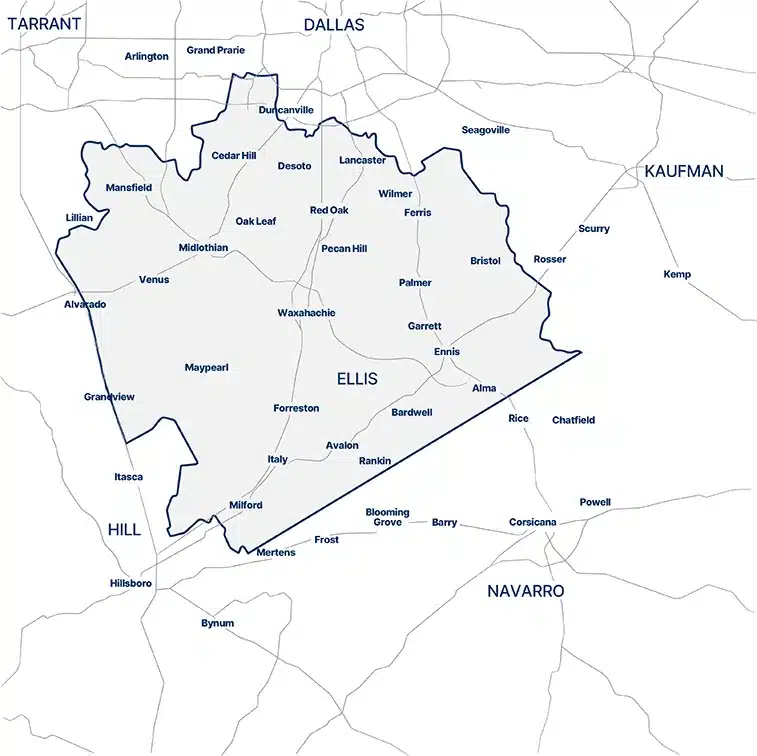
OUR SERVICE AREA
WE LOVE ELLIS COUNTY
We make Ellis County our home base, and proudly serve these cities in these areas...
- Alvarado
- Avalon
- Cedar Hill
- Dallas
- Desoto
- Duncanville
- Ennis
- Ferris
- Forreston
- Grandview
- Italy
- Lancaster
- Mansfield
- Maypearl
- Midlothian
- Milford
- Palmer
- Oak Leaf
- Ovilla
- Red Oak
- Venus
- Waxahachie
- Wilmer


